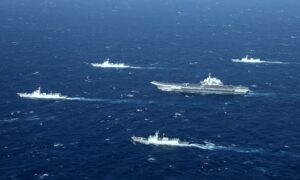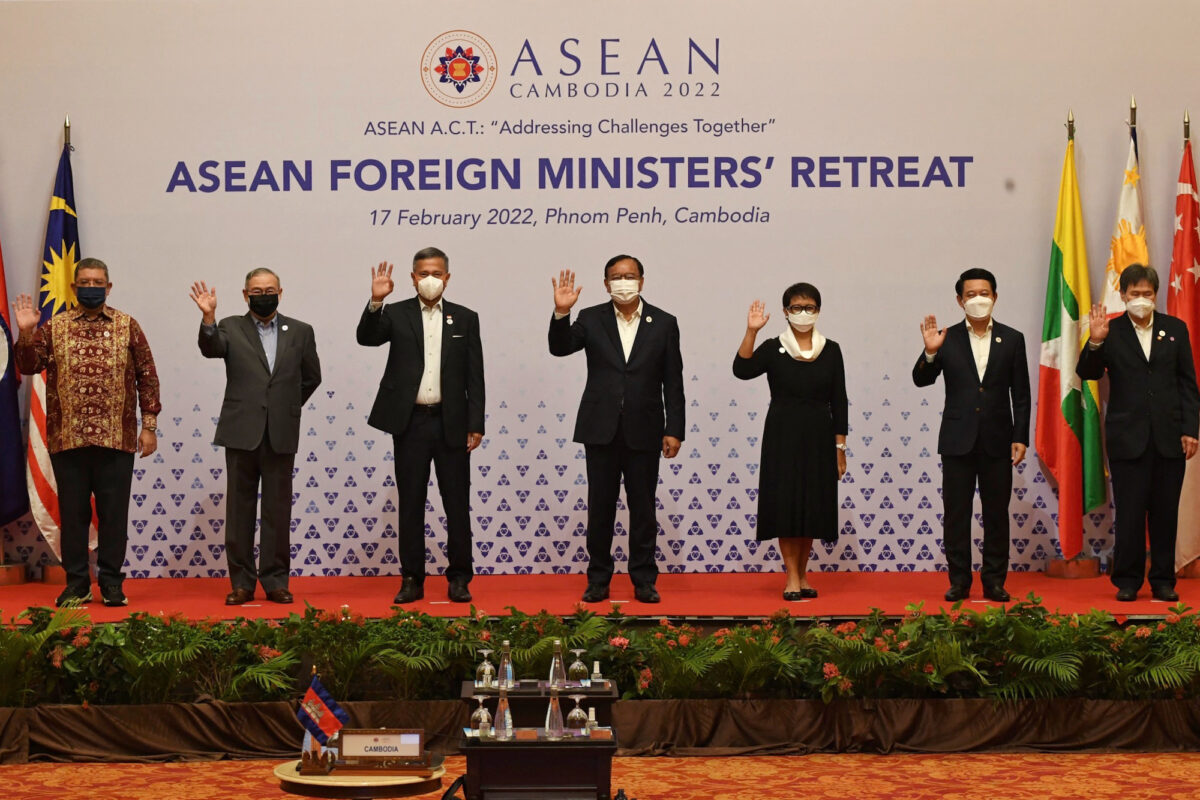Though Fearful of China, Southeast Asia Still Prefers to Go It Alone
CommentaryWhen the noted writer and philosopher—and ardent atheist—Voltaire lay dying, a priest was supposed to have attempted a deathbed conversion; but when the priest urged him to renounce Satan, Voltaire replied, “Now is not the time to be making enemies.” I felt a similar experience when I attended a pair of back-to-back conferences last month in Vietnam and Indonesia. Both meetings brought together foreign policy and national security experts from the United States and these two countries to discuss how Southeast Asia and Washington could expand cooperation in the face of growing Chinese aggression in the region, particularly in the South China Sea. In particular, the conferences posed scenarios in which China took increasingly belligerent actions in the region, threatening the security of these two countries. The United States, in turn, offered these countries the opportunity to forge closer ties with Washington and to join forces to openly oppose a common foe. Surprisingly, to many of us American participants, the response from the Vietnamese and the Indonesians was a polite “no thanks.” Many Indonesian and Vietnamese participants welcomed the opportunity to acquire U.S. weapons or receive U.S. intelligence. Still, they then said that if there were any problems with the Chinese, they would handle it on their own and definitely not in alliance with the United States. This attitude would hardly shock anyone with deep exposure to the Southeast Asian mindset. Notoriously independent, almost to the point of being bloody-minded, nations in the region are keen to keep both Beijing and Washington at arm’s length, engaging them on an ad hoc basis when it suits their national interests. Even supposed allies of the United States, such as Thailand and the Philippines, tend to go their own way more often than not. In a way, it is reminiscent of the ohne mich (“count me out”) protest movement in West Germany in the early 1950s. Supporters of this movement wanted to be neither in NATO nor the Warsaw Pact but apart from it all. For the most part, Southeast Asia still believes it can, through various regional security infrastructures, draw in Beijing and make it a responsible player. The most important of these is the Association of Southeast Asian Nations or ASEAN. Foreign ministers of the Association of Southeast Asian Nations (ASEAN) pose for a group photo during the ASEAN Foreign Ministers’ Retreat in Phnom Penh, Cambodia, on Feb. 17, 2022. (Tang Chhin Sothy/AFP via Getty Images) ASEAN is at the center of several regional forums for promoting security and good relations within the region and dealing with actual or potential disputes. Premier among these is the biannual ASEAN summit, a meeting of the member states’ heads of government during which they discuss and resolve regional issues. This summit usually includes additional security-building dialogues with other countries outside ASEAN, such as China, Japan, and South Korea (ASEAN+3). ASEAN+3 is intended to create a forum for Southeast and Northeast Asia to come together to deal with economic, financial, and nontraditional security issues (such as infectious diseases and transnational crime) in the region. ASEAN also conducts the ASEAN Regional Forum (ARF). The ARF includes all of the ASEAN members, plus Australia, Bangladesh, Canada, China, the European Union, India, Japan, North Korea, South Korea, Mongolia, New Zealand, Pakistan, Papua New Guinea, Russia, Sri Lanka, Timor Leste, and the United States. The ARF is a principal forum for security dialogue in Asia, complementing various bilateral dialogues. Additionally, ASEAN is the lead organizer of the East Asia Summit (EAS), a pan-Asian regional community-building forum held annually by the leaders of 18 countries: the 10 ASEAN member states, Australia, China, Japan, South Korea, India, New Zealand, Russia, and the United States. In addition to meetings and forums, ASEAN has taken the lead in practical initiatives to promote regional security and reduce tensions. In 1995, for example, ASEAN member states signed the Southeast Asian Nuclear-Weapons-Free Zone Treaty. This treaty bans all nuclear weapons in the region and obligates its members not to develop, manufacture, or otherwise acquire, possess, or have control over nuclear weapons. Ultimately, ASEAN is about Southeast Asia controlling its own destiny. It welcomes U.S. weaponry but not U.S. political-military entanglements. In the first place, there is genuine concern that Washington would not keep its promises, leaving any regional partners and allies out in the cold. And indeed, there is cause for doubting U.S. commitments, especially given that the past two or three U.S. presidents haven’t done a very good job articulating and inaugurating a credible U.S. Asia policy. At the same time, the Southeast Asians (or at least the Vietnamese and Indonesians attending the conferences) were adamant that they could and would stand up to China on th

Commentary
When the noted writer and philosopher—and ardent atheist—Voltaire lay dying, a priest was supposed to have attempted a deathbed conversion; but when the priest urged him to renounce Satan, Voltaire replied, “Now is not the time to be making enemies.”
I felt a similar experience when I attended a pair of back-to-back conferences last month in Vietnam and Indonesia. Both meetings brought together foreign policy and national security experts from the United States and these two countries to discuss how Southeast Asia and Washington could expand cooperation in the face of growing Chinese aggression in the region, particularly in the South China Sea.
In particular, the conferences posed scenarios in which China took increasingly belligerent actions in the region, threatening the security of these two countries. The United States, in turn, offered these countries the opportunity to forge closer ties with Washington and to join forces to openly oppose a common foe.
Surprisingly, to many of us American participants, the response from the Vietnamese and the Indonesians was a polite “no thanks.” Many Indonesian and Vietnamese participants welcomed the opportunity to acquire U.S. weapons or receive U.S. intelligence. Still, they then said that if there were any problems with the Chinese, they would handle it on their own and definitely not in alliance with the United States.
This attitude would hardly shock anyone with deep exposure to the Southeast Asian mindset. Notoriously independent, almost to the point of being bloody-minded, nations in the region are keen to keep both Beijing and Washington at arm’s length, engaging them on an ad hoc basis when it suits their national interests.
Even supposed allies of the United States, such as Thailand and the Philippines, tend to go their own way more often than not. In a way, it is reminiscent of the ohne mich (“count me out”) protest movement in West Germany in the early 1950s. Supporters of this movement wanted to be neither in NATO nor the Warsaw Pact but apart from it all.
For the most part, Southeast Asia still believes it can, through various regional security infrastructures, draw in Beijing and make it a responsible player. The most important of these is the Association of Southeast Asian Nations or ASEAN.

ASEAN is at the center of several regional forums for promoting security and good relations within the region and dealing with actual or potential disputes. Premier among these is the biannual ASEAN summit, a meeting of the member states’ heads of government during which they discuss and resolve regional issues. This summit usually includes additional security-building dialogues with other countries outside ASEAN, such as China, Japan, and South Korea (ASEAN+3). ASEAN+3 is intended to create a forum for Southeast and Northeast Asia to come together to deal with economic, financial, and nontraditional security issues (such as infectious diseases and transnational crime) in the region.
ASEAN also conducts the ASEAN Regional Forum (ARF). The ARF includes all of the ASEAN members, plus Australia, Bangladesh, Canada, China, the European Union, India, Japan, North Korea, South Korea, Mongolia, New Zealand, Pakistan, Papua New Guinea, Russia, Sri Lanka, Timor Leste, and the United States. The ARF is a principal forum for security dialogue in Asia, complementing various bilateral dialogues.
Additionally, ASEAN is the lead organizer of the East Asia Summit (EAS), a pan-Asian regional community-building forum held annually by the leaders of 18 countries: the 10 ASEAN member states, Australia, China, Japan, South Korea, India, New Zealand, Russia, and the United States.
In addition to meetings and forums, ASEAN has taken the lead in practical initiatives to promote regional security and reduce tensions. In 1995, for example, ASEAN member states signed the Southeast Asian Nuclear-Weapons-Free Zone Treaty. This treaty bans all nuclear weapons in the region and obligates its members not to develop, manufacture, or otherwise acquire, possess, or have control over nuclear weapons.
Ultimately, ASEAN is about Southeast Asia controlling its own destiny. It welcomes U.S. weaponry but not U.S. political-military entanglements. In the first place, there is genuine concern that Washington would not keep its promises, leaving any regional partners and allies out in the cold. And indeed, there is cause for doubting U.S. commitments, especially given that the past two or three U.S. presidents haven’t done a very good job articulating and inaugurating a credible U.S. Asia policy.
At the same time, the Southeast Asians (or at least the Vietnamese and Indonesians attending the conferences) were adamant that they could and would stand up to China on their own. Offers of an alliance almost seemed to insult their capacities for defending themselves.
For any individual Southeast Asian country to think it can counter China militarily on its own might be appealing on a strictly national level, but it also borders on hubris (or even delusional). In any event, it is unlikely that the United States, unless it can seriously step up its game in Southeast Asia and show that it can keep its promises, will make much headway in lining up partners to oppose China. Until then, ohne mich.
Views expressed in this article are the opinions of the author and do not necessarily reflect the views of The Epoch Times.












